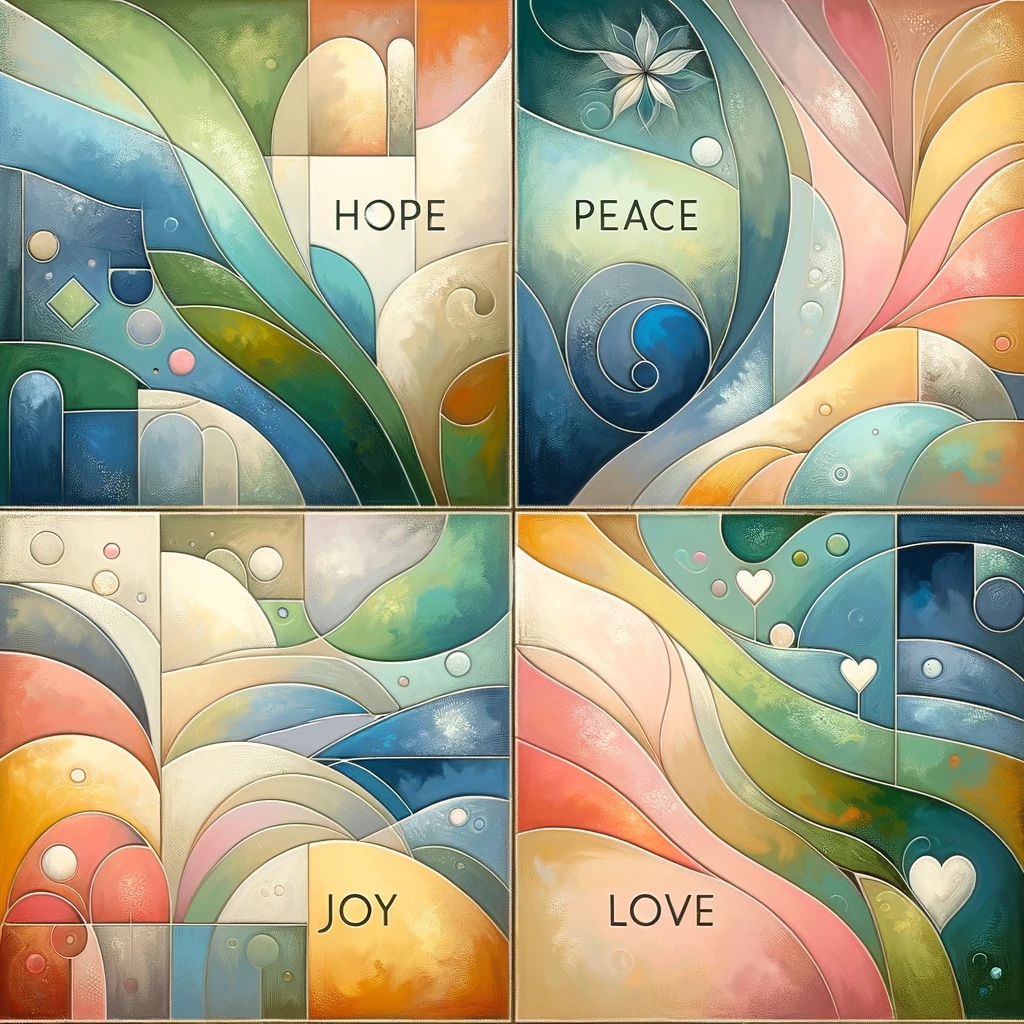This is the time of the year I feel overwhelmed with the pressure to put together gift lists and buy just the right presents for my children. And they incessantly talk about what they want Santa to bring them. I gently remind them that Christmas is a celebration of Jesus’ birthday. During one conversation, my four year old son asked, “What are we going to get God for Christmas?”
“That’s a great question!” I responded.
It was a lovely question to ponder. It is the season of giving, after all. But how often do we consider what we’re going to give God?
The four weeks of Advent have traditionally been paired with four themes: Hope, peace, joy, and love. The origin of these themes are not clear, but they can be seen not just as gifts form God, but gifts, that by engaging with them, can be given back to God. That itself is how Ignatius saw the gifts from God, given to us to use “for the greater glory of God”.
Let’s examine, from an Ignatian perspective, these four Advent gifts and see how they become gifts to God.
Hope

Created by DALL-E 3
Hope is what grounds us as Christians. We are a people of hope. This means we have a solid foundation of trust in God’s providence. The Ignatian principle of indifference is also grounded in this. In his Principle and Foundation Ignatius describes indifference as not wanting “health rather than sickness, riches rather than poverty, honor rather than dishonor, long rather than short life.” When people ask me how this is possible, I always say that it’s rooted in a trust that no matter what happens, in God all will be well. God will take care of me. What is more hopeful than that? There’s a true sense of surrender here. What a gift to God to be trusted.
Ignatius imagines God labouring in our lives and in the world for our good. Advent is a time of hopeful anticipation for that time when all creation unites in a peaceful harmony.
Peace
Peace is a sign of being in tune with God. Ignatius describes consolation as a movement toward God characterised by “peace, tranquillity and quiet.” This is an important insight for discernment, as we turn our attention to the inner movements of our soul. This peace is a deep-seated sense of rightness, even amidst external turmoil.
During this time of year we recall Jesus’ title as “Prince of Peace”, one who promises that sense of “rightness” in God’s kingdom. This time of year the world recognises its desire for “peace on earth”, even amidst war and conflict. When we engage in a regular practice of noticing the threads of peace in our lives, we are giving God the gift of our attention, noticing those moments of God’s presence and love.
Joy
Speaking of gifts, Ignatian spirituality prioritises gratitude. Gratitude is not only a recognition of the gifts, but of the giver. Joy, in Ignatian terms, is a profound sense of gratitude and fulfilment that comes from recognising and appreciating God’s gifts. When we see the abundant generosity of God, our gratitude fills us with joy. Joy therefore is a sign of God, and a sign of consolation. This is to be differentiated from the ebbs and flows of happiness. Joy is lasting and eternal. Its companion is peace and hope.
The lead up to Christmas, even commercially, emphasises joy. But true joy does not come in presents and material things. It comes in a deep sense of being loved. Again, our joyful gratitude is not really for the gifts, but for the Giver.
Love
Love is the reason for everything. St Ignatius loved the Incarnation because it was an act of love. In his Meditation on the Incarnation he imagines God gazing upon the world with a deep love and choosing to be close to the human experience. Jesus’ coming was no so much as a repair man, but as a lover. Finding God in all things is about seeing this incarnational reality, that all creation is imbued with this divine love. Richard Rohr says that Christ is another name for everything. Christ is the gift, the given. Christ is the incarnational reality of our world, the proof that God who is love takes on the material world. This is what we really celebrate at Christmas.
At the end of the Spiritual Exercises Ignatius celebrates the nearness of God’s love by inviting us to reflect on the nature of God’s endless love and how it manifests in the created world:
Look how God dwells in creatures, in the elements, giving them being, in the plants vegetating, in the animals feeling in them, in [people] giving them to understand: and so in me, giving me being, animating me, giving me sensation and making me to understand; likewise making a temple of me, being created to the likeness and image of [God’s] Divine Majesty.
What a gift! But love is the animating force that moves us outward, beyond ourselves. We love both God and neighbour. Our interior life has exterior action.
When we hold and attend to these four gifts, we are offering them back to God. When I live in a spirit of hope and trust in God’s faithfulness, when I notice the peace when I am attuned to God, when I joyfully appreciate the gifts and the Giver, and when I embrace the love of God in those gifts, I am in a deep communion with God.
I am reminded of Ignatius’ Suscipe prayer of acceptance and surrender of gift:
Take, Lord, and receive all my liberty, my memory,
my understanding and my entire will,
All I have and call my own. You have given all to me.
To you, Lord, I return it. Everything is yours; do with it what you will.
Give me only your love and your grace. That is enough for me.
So what will I give God this Christmas?
As I ponder my son’s innocent question, it becomes clear that the true gifts we can offer to God this Christmas are not material, but rather the very essence of our beings, lived out through hope, peace, joy, and love. By embracing these gifts of the Advent season and embodying them in our daily lives, we answer the call of the Suscipe prayer, offering back to God all that we are and all that we have.
In the end, perhaps the best gift we can offer God is to simply be present – to God, to ourselves, and to each other – fully embracing the sacredness of this season. In doing so, we not only honour the birth of Christ, but we also become living testimonies of his enduring and transformative love.
Related posts:
- Imagine Advent – a four-week Advent series of audio meditations
- Rejoicing in the Third Week of Advent
- Advent is Our Story
Listen to the podcast version of this post…








